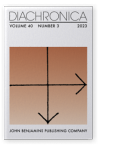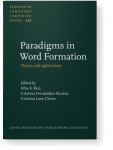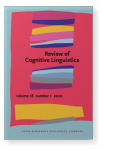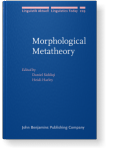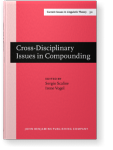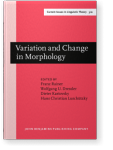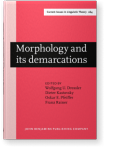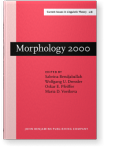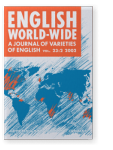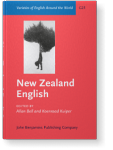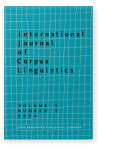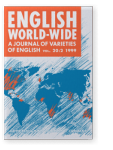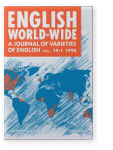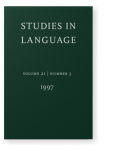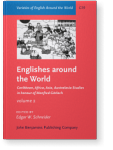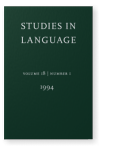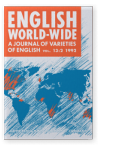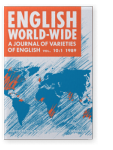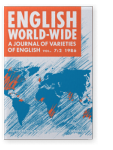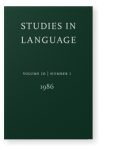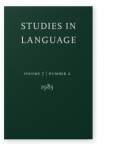Laurie Bauer
List of John Benjamins publications for which Laurie Bauer plays a role.
2023 A terminological problem: Humboldt’s Universal Diachronica 40:3, pp. 433–437 | Squib
The term “Humboldt’s Universal”, introduced to linguistics in the 1970s, appears to be synonymous with a number of other expressions, some of which are also used to denote different phenomena (e.g. isomorphism). In this paper, the extent of the terminological problem is highlighted, and a plea… read more
2022 Chapter 3. Interlocking paradigms in English compounds Paradigms in Word Formation: Theory and applications, Ruz, Alba E., Cristina Fernández-Alcaina and Cristina Lara-Clares (eds.), pp. 59–68 | Chapter
In this contribution, I consider the paradigmatic structure of compounds in English, showing that the various paradigms overlap and interlock, leading to a network of paradigmatic structures. I briefly consider the implications of such a structure for non-compound structures as well, and discuss… read more
2020 Arbitrariness, motivation and idioms Review of Cognitive Linguistics 18:1, pp. 162–179 | Article
This paper considers the interplay between arbitrariness and the widely-accepted ideals of one form, one meaning and compositionality. They are shown to operate in different domains, and to clash where there is idiomaticity. Idioms provide familiar forms which are not semantically relevant to the… read more
2016 Re-evaluating exocentricity in word-formation Morphological Metatheory, Siddiqi, Daniel and Heidi Harley (eds.), pp. 461–478 | Article
The distinction between endocentric and exocentric is usually taken as an important semantic factor in classifying compounds. But the same division does not appear to be used in classifying derivatives. This may be because exocentricity has no obvious correlates in derivation; but it is argued here… read more
2010 The typology of exocentric compounding Cross-Disciplinary Issues in Compounding, Scalise, Sergio and Irene Vogel (eds.), pp. 167–176 | Article
On the basis of a survey of types of exocentric compound found in a large number of languages, a small set of basic types is established. Even one of these is considered marginal. These basic types are described and exemplified, with problems of nomenclature and description being discussed. The… read more
2010 Affixation vs. conversion.: The Resolution of conflicting patterns Variation and Change in Morphology: Selected papers from the 13th International Morphology Meeting, Vienna, February 2008, Rainer, Franz, Wolfgang U. Dressler, Dieter Kastovsky and Hans Christian Luschützky (eds.), pp. 15–32 | Article
This is a case-study in what happens when word-formation processes compete for bases. Based on a sample of English adjectives, this paper examines how two conflicting patterns (-en suffixation and conversion) distribute themselves in the formation of corresponding deadjectival verbs. Focus is on… read more
2005 The Borderline between Derivation and Compounding Morphology and its demarcations: Selected papers from the 11th Morphology meeting, Vienna, February 2004, Dressler, Wolfgang U., Dieter Kastovsky, Oskar E. Pfeiffer and Franz Rainer (eds.), pp. 97–108 | Article
2002 3. What you can do with derivational morphology Morphology 2000: Selected papers from the 9th Morphology Meeting, Vienna, 24–28 February 2000, Bendjaballah, Sabrina, Wolfgang U. Dressler, Oskar E. Pfeiffer and Maria D. Voeikova (eds.), pp. 37–48 | Chapter
2002 Can we watch regional dialects developing in colonial English? The case of New Zealand English World-Wide 23:2, pp. 169–193 | Article
The regional homogeneity of New Zealand English is frequently commented on. Similar observations on varieties such as Australian English were simply precursors to the discovery of regional dialects. In this paper a report is given of a survey of New Zealand primary school children, which showed… read more
2000 3. The dialectal origins of New Zealand English New Zealand English, Bell, Allan and Koenraad Kuiper (eds.), pp. 40–52 | Article
2000 Contextual Clues to Word-Meaning International Journal of Corpus Linguistics 5:2, pp. 231–258 | Article
1999 On the Origins of the New Zealand English Accent English World-Wide 20:2, pp. 287–307 | Article
In this paper it is argued that the New Zealand English accent is a mixed accent in origin, showing input from many areas in England south of a line from Cheshire to the Wash. It is argued that attributing the accent to more specific areas in England is possible only if some of the phonetic… read more
1997 Evaluative Morphology: In Search of Universals Studies in Language 21:3, pp. 533–575 | Article
Various claims from the previous literature about the way in which evaluative morphology (particularly diminutives and augmentatives) operates are tested on a large sample of languages. Evaluative morphology is seen as being less morphologically marginal than has been implied in some of the recent… read more
1997 Attempting to trace Scottish influence on New Zealand English Englishes around the World: Studies in honour of Manfred Görlach, Schneider, Edgar W. (ed.), pp. 257–272 | Article
1994 Structural Analogy: An Examination of Some Recent Claims Studies in Language 18:1, pp. 1–22 | Article
In a number of publications, John Anderson and his colleagues have developed the notion of Structural Analogy — the assumption that structural principles generalise across levels of language — as a meta-theoretical principle of linguistics. In this paper some recent works which appear to criticise… read more
1992 The Second Great Vowel Shift Revisited English World-Wide 13:2, pp. 253–268 | Article
1989 The Verb HAVE in New Zealand English English World-Wide 10:1, pp. 69–83 | Article
1986 Notes on New Zealand English Phonetics and Phonology English World-Wide 7:2, pp. 225–258 | Article
1986 Review of Lightner (1983): Introduction to English Derivational Morphology Studies in Language 10:1, pp. 223–231 | Review
1983 Review of Ruhlen (1976): A Guide to the Languages of the World Studies in Language 7:2, pp. 328–331 | Review
